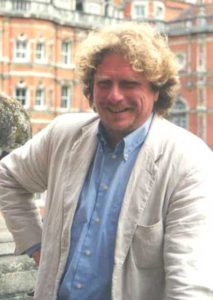By Professor Mark Goldie

Justin Champion, a leading scholar of the intellectual history of early modern Britain, died on 10 June, after facing six years of brain cancer with astonishing resilience. His historical avocations were varied. Early in his career he published on epidemics in London. He was a regular broadcaster on TV and radio, bringing history to wide audiences, as he also did when President of the Historical Association, the national ‘voice for history’. He received the Medlicott Medal for outstanding services to history. And he pioneered the Masters course in Public History at Royal Holloway College London, whose graduates fanned out into the media and heritage sectors.
As an intellectual historian Justin’s domain was the ‘crisis of Christianity’ that occurred in the late seventeenth and early eighteenth centuries. He reprised Paul Hazard’s La Crise de la conscience Europeenne (1935) but transferred the scene of action from France to England. If the ready label is to call this period the Early Enlightenment, Justin belonged to the movement that insisted that it was no less the Late Reformation. As John Pocock urged, in England ‘enlightenment’ unfolded within Christian theology, ecclesiology, and ‘sacred history’. Justin published two books, three editions, and fifty essays. His doctoral thesis became Pillars of Priestcraft Shaken: The Church of England and its Enemies, 1660-1730 (1992), and his work on John Toland culminated in Republican Learning: John Toland and the Crisis of Christian Culture, 1696-1722 (2002). The people about whom he wrote are a group of English and Irish radicals, connected personally and intellectually, who published voluminously and recklessly against Christian orthodoxy between the 1650s (John Biddle the Socinian) and the 1720s (John Trenchard and Thomas Gordon’s journal The Independent Whig). They include Charles Blount, Anthony Collins, Benjamin Furly, Sir Robert Howard, Robert Molesworth, Walter Moyle, Matthew Tindal, and the third earl of Shaftesbury. But the towering figure is the freethinker, contrarian, and scholar-polemicist Toland.
If Justin was nurtured in the ‘Cambridge School’ (his doctoral thesis title was Pocockian: ‘The Ancient Constitution of the Christian Church’), he soon drew sustenance from a variety of new methodological influences afoot from the 1980s onwards. He was keen reader of Michel de Certeau; he investigated the material conditions of publication and clandestinity; reception and readership; book history; the circulation of manuscripts; the history of scholarship. He explained the character of the Republic of Letters. He accented less the philosophical content of ideas and more the shifting nature of cultural and textual authority. He provided not so much conceptual histories as social and cultural histories of ideas. He was interested in textual hermeneutics, the seventeenth-century development of biblical criticism, which exposed the extent of textual variation and the problem of canonicity. By around 1700 it came to seem to the heterodox that the church was constitutive of the Bible, not the Bible of the church. Yet he saw his radicals not as doctrinaire anti-Christians but as Socratic enablers, releasing people from the authority of priests; continuing the programme of ‘reformation’, purifying the church of the remnants of papistical priestcraft. His radicals were not, he argued, especially innovative in their scholarship, but were novel, and dangerous, in their polemical and demotic redeployment of arcane humanist and Reformation scholarship. Their crime was to make high scholarship, with its hermeneutic sense of the fragility of the textual transmission of sacred texts, available to wider audiences. Elite erudition became public property. Not least of the influences on Justin was Christopher Hill, a now often disregarded historian of popular radicalism. Justin was himself an anticlerical, and his work made for some ambivalence in the face of contemporary scholarship on the Enlightenment. At moments he could look like an unreconstructed historian of the mid-twentieth century, in the manner of Peter Gay – Enlightenment as the end of Christianity and the triumph of secularism; but equally he well understood, and participated, in the present current, which holds that God survived the Enlightenment, not least because the early Enlightenment radicals insisted that they were lay theologians within the Reformed tradition. On this view, the Enlightenment was (to borrow the title of Robert Ingram’s recent book) ‘Reformation without end’.
A phrase Justin once used of the scholar Richard Popkin, ‘erudite, witty, and wicked’, applies equally to Toland – and to Justin himself. Justin was a libertarian and a gadfly iconoclast. (Literally so: one of his last public lectures was an exuberant illustrated history of statue toppling and statue defacing.) He was a high-spirited and generous colleague, mentor, and friend. His final project, an edition of Thomas Hobbes’s late writings on religion, heresy, and church history will appear posthumously.
Mark Goldie, Churchill College, Cambridge, 1 July 2020, mag1010@cam.ac.uk